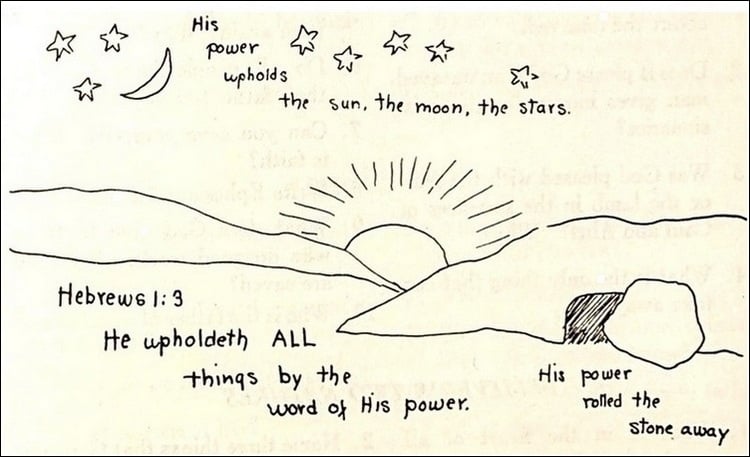Afterwords -- rejoice always

"Rejoice in the Lord always; again I will say, rejoice." (Philippians 4:4)
Χαίρετε ἐν κυρίῳ πάντοτε· πάλιν ἐρῶ, χαίρετε.
May 8, 2024
Dear friends,
Philippians is good for whatever ails you! If you're ever at a loss for a book of the Bible to read, you can always turn to Philippians, four short chapters, and you will certainly be encouraged.
I return often to this little epistle from the Apostle Paul. He was under arrest in Rome, awaiting his first hearing before a cruel and unstable emperor, Nero. He wasn't sure if he was going to live or die. Some Christians in Rome didn't really support Paul in his imprisonment; some church leaders in Philippi weren't getting along; and only a few of his coworkers were serving Christ selflessly. Humanly speaking, this fledgling movement we now call Christianity was small, vulnerable, and seemingly easy to extinguish. Paul had every reason to be depressed. This letter, however, is filled with such joy. (Take time to read through Philippians and note all the things Paul is joyful about.)
REJOICE. Here are four things to observe from the fourth verse in chapter 4 -- "Rejoice in the Lord always..." (4:4) This call to rejoice is an imperative ("rejoice"); it's focused ("in the Lord"); it's to be ongoing ("always"); and it's emphatic ("again I will say..."). First, the verb is in the imperative mood, which expects an intentional action in response. "Rejoice" is not a suggestion to feel happy or to merely cheer up (accompanied with a pat on the back). In fact, we don't really have much control over our emotions, do we? Rather, Paul is directing the Philippian believers (and believers today) to actively rejoice (that is, to find joy in, take pleasure in, delight in) something. Paul is not addressing feelings, but rather, the mind and heart, what we think about and take pleasure in. Emotions will follow in time.
IN THE LORD. Secondly, it's focused -- "rejoice in the Lord..." This is not about circumstances or generalizations, as in, "things will get better". In this letter Paul takes joy in the things of the Lord -- what God is doing to advance the gospel, his working in the lives of believers, the blessing of faithful friends and co-workers, and the bright future of our ultimate destination. The secret to this joy is seen in verse 8, and where we are told to focus our minds: "...whatever is true, whatever is honorable, whatever is just, whatever is pure, whatever is lovely, whatever is commendable, if there is any excellence, if there is anything worthy of praise, think about these things." These things all find their origination in God, and they find their perfection in God himself. He it is who is true, honorable, pure, lovely, commendable, excellent, and worthy of praise. We will not find joy by searching for joy itself, but rather by seeking God. Joy is a fruit that the Holy Spirit gives.
ALWAYS. Thirdly, this joy is ongoing -- "rejoice...always". This is not a call to cheer up a little bit, for a little while, or to be happy in the moment. This is an ongoing lifestyle of filling our minds with what truly matters. It's about applying our minds and hearts to see the joy in what God has done, is doing, and will be doing for the glory of his Son, our Lord Jesus. We can rejoice always because God is always God, always in control, always the same compassionate and powerful Being. He is unchanging in his nature, character, and purpose. And his provisions of grace will never run out on us: "...my God will supply every need of yours according to his riches in glory in Christ Jesus." (4:19)
AGAIN I WILL SAY. And finally, this mandate to rejoice in the Lord is emphatic, being repeated twice -- "Again, I will say..." This is not a platitude or a good wish. This kind of joy, along with thanksgiving and prayer, is the will of God for us, now and forever -- "Rejoice always, pray without ceasing, give thanks in all circumstances; for this is the will of God in Christ Jesus for you." (1 Thess 5:16-18) Even in the face of hostile world powers and our human frailties, Paul says, "Again, I will say, rejoice." Thankfully, one day all the things that dampen our joy in the Lord will be removed and we shall see him clearly in glory.
Turning back to the second chapter of Philippians, we are shown the length and breadth of Christ's work, his coming to earth, serving unto death, being raised and ascended on high. Sometimes we fret too much over conditions in this world. We should grieve over sin and evil. Yet we should rejoice that every knee will bow to the lordship of Christ. No criminal, no liar or thief, no corrupt politician or ruler will ever thwart God's purpose or get away with anything. Either there will be repentance or there will be retribution. "The Lord is at hand," writes Paul (4:5). The Apostle is not wringing his hands about appearing before this cruel Caesar Nero.
Paul has his eyes on reality, the joyful reality of God's goodness, power, and sovereignty over all things. And so, he tells us, "Rejoice in the Lord always; again I will say, rejoice." We must ask ourselves, are we responding in this way?
WHAT I'M READING.
I'm currently reading A History of Christianity in the United States and Canada (Eerdmans, 2019) by Mark Noll. Noll has excellent insights on both the good and bad in North American church history.
I'm also reading Children of the Living God (Banner of Truth, 1989) by Sinclair Ferguson. Here's an excerpt...
(When we know our relationship to the Father as his children) "... it produces a sense of security. I am a child of God. He is my Father. He understands and cares for me. The Christian, of all people, should be increasingly aware of who he really is. That knowledge gives me stability in an unstable world. Knowing in the very depths of my being who I am, as I come increasingly to appreciate what it means to be a child of God, has a tremendously powerful effect. It sets me free from the world's anxious quest to 'be somebody'. (See Jesus' emphasis on this issue in Matthew 6:1-18. Freedom from the desire to be known as 'some-body' depends on knowing that 'your Father knows'.)" (Sinclair Ferguson)
OTHER ARTICLES AND LINKS.
-- This post is a little outline on how to deal with anxiety from Philippians 4, which I learned from Chaplain Bill Bryan many years ago at DTS.
-- Technology will not save us. Read "The Techno-Optimist and the Lonely Man of Faith."
-- "The problem for scientism is that science is descriptive, not prescriptive; science attempts to describe what is the case, but it cannot prescribe what ought to be the case." (J. P. Moreland) Read "5 Things Science Cannot Explain (but Theism Can)"
-- We have enjoyed learning about Yorkshire folk songs, old and new, from the music of Kate Rusby.
-- We recently made some guajillo chili sauce using this recipe. It was delicious!
FINAL QUOTE.
"Joy is the gigantic secret of the Christian." (G. K. Chesterton)
That's it for this week!
Sandy
Image credits. The drawing above was made by Mrs. Ruth Barnhouse in Teaching the Word of Truth (1940), a book published by Donald Grey Barnhouse containing gospel lessons for children. The photo below is of the chalkboard at Mill Mountain Coffee in Salem, VA. Unless otherwise indicated, all Scripture quotations are from The ESV Bible (The Holy Bible, English Standard Version), copyright 2001 by Crossway, a publishing ministry of Good News Publishers. Used by permission. All rights reserved.
